You expect your closest family and friends always to have your back. Though true love and friendship require honesty, not just support, not all criticism is equal. Some comments can be constructive while others can be truly toxic and eat away at your self-confidence. Like if one of your parents starts body-shaming you. How you say something is just as important as what you say.
Internet user u/Academic_Bear5911 went viral online after asking the AITA community whether she was wrong to call out her mother’s behavior. The older woman, a former model, had repeatedly made harsh comments about her daughter’s appearance and weight. Things finally came to a head when she outright called the 19-year-old fat. Read on for the full story and the advice the internet gave the author. Bored Panda has reached out to u/Academic_Bear5911, and we’ll update the article once we hear back from her.
It can be incredibly hurtful to realize that the people close to you can’t stop ignoring your boundaries

Image credits: syda_productions (not the actual image)
A young woman opened up about how her mom keeps making fun of her appearance and weight. She finally had enough


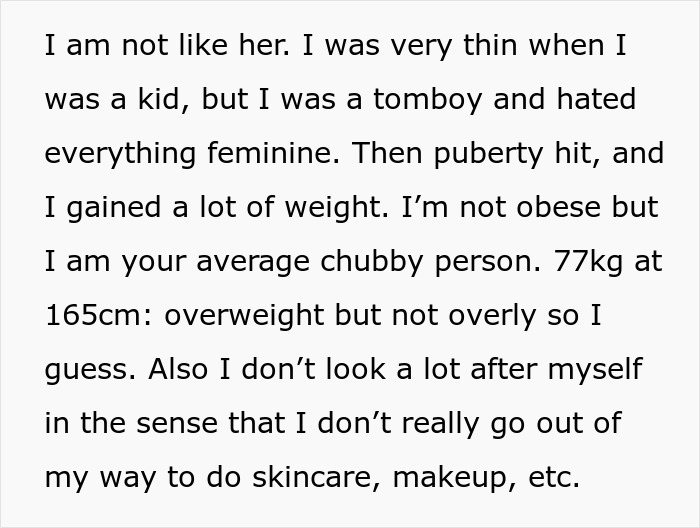

Image credits: Curated Lifestyle (not the actual image)
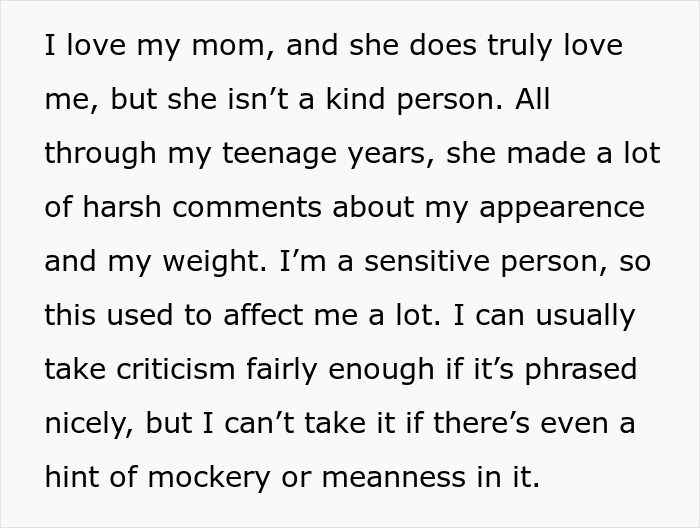


Image credits: peoplecreations (not the actual image)
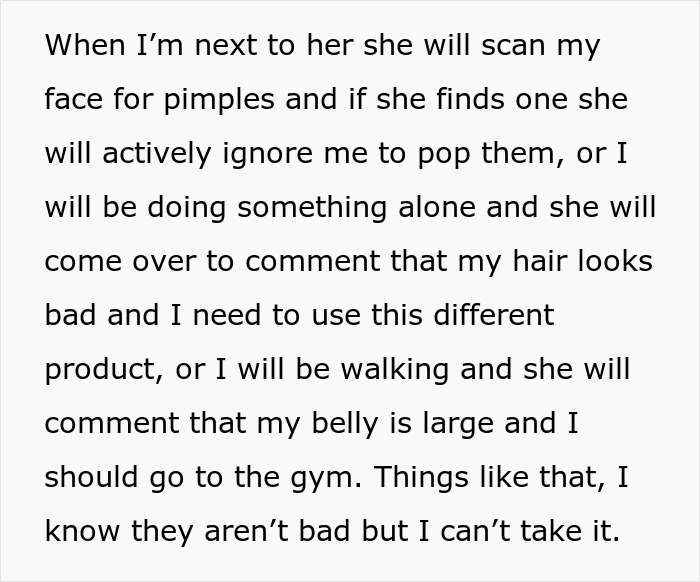
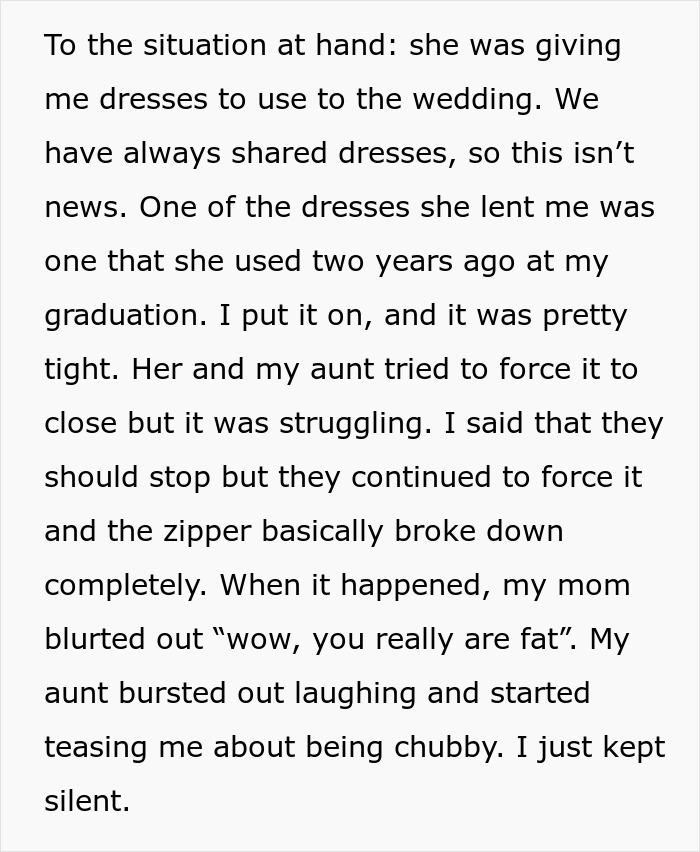

Image credits: hngstrm (not the actual image)
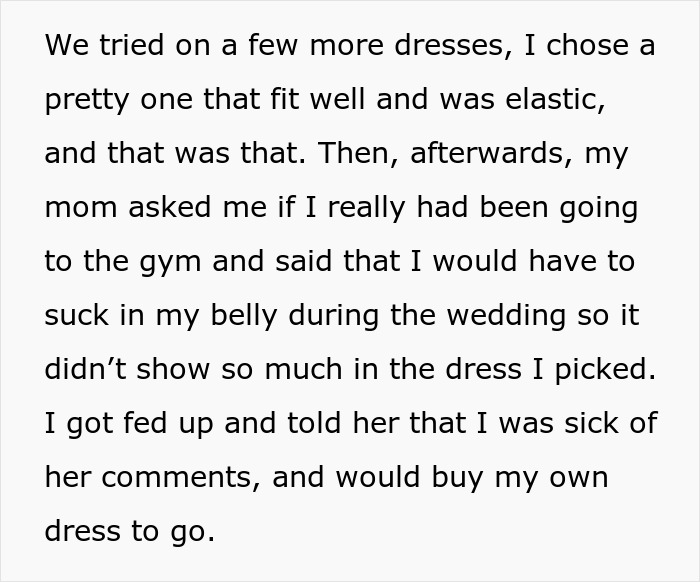

Image credits: Academic_Bear5911
Fat shaming can be harmful to your physical and mental health. It is not a good way to convince someone to change
Let’s be clear: fat shaming is wrong, affects people in negative ways, and is unproductive if you want your loved ones to embrace a healthier lifestyle. Making constant negative comments about someone’s appearance is low-key bullying.
It’s even worse when a person you look up to says things that gnaw away at your confidence. You need to remind them of your boundaries. If they continue to ignore them, there need to be consequences. For instance, a natural consequence for someone constantly throwing insults your way would be for you to spend far less time around the person or to ignore them entirely until they change their behavior.
Presenters at the Canadian Obesity Summit held in 2019 said that fat shaming is harmful to health and can actually drive weight gain. Angela Alberga, an assistant professor in the department of health, kinesiology, and applied physiology at Concordia University said that anti-fat bias is rampant in all parts of society, including in medicine.
According to Alberga, studies have shown that exposing a person to weight bias triggers physiological and behavioral changes that are linked to poor metabolic health and increased weight gain. Your cortisol spikes, your self-control drops, and you risk binge-eating. “You actually experience a form of stress,” Alberga says.
She added that fat shaming is linked to depression, anxiety, and low self-esteem, as well as eating disorders and exercise avoidance.

Image credits: Getty Images (not the actual image)
Your weight isn’t the only important thing when it comes to fitness, but too much of it increases your risk of developing serious diseases
That being said, it is absolutely vital to develop healthy habits and stick to them. Being overweight or obese has a huge effect on the quality of your life and drastically increases your risk of developing debilitating diseases.
According to the NHS, obesity increases the risk of developing type 2 diabetes, coronary heart disease, various cancers, stroke, and depression.
Your quality of life and self-esteem are likely to suffer, too. Day-to-day problems related to obesity include breathlessness, increased sweating, snoring, chronic exhaustion, difficulty doing physical activity, and joint and back pain. You’re also likely to have low confidence and may feel more isolated from other people as a result.
Obesity also increases your risk of developing high blood pressure, high cholesterol, asthma, metabolic syndrome, gastro-oesophageal reflux disease, gallstones, reduced fertility, osteoarthritis, liver disease, kidney disease, and pregnancy complications.
If you’re worried about a loved one’s unhealthy habits and health, it really does matter how you phrase things. Broadly speaking, the less judgmental you are, the better. Someone who feels constantly under attack is unlikely to listen to you. Meanwhile, your criticism has to offer some solutions, instead of being just snide comments about how someone’s living life ‘wrong.’
Outside factors like specific rewards can be useful when you have a concrete aim, but it’s your intrinsic goals that will keep you motivated in your fitness journey when things get tough. If you decide to live a more active and healthy life, you should do it for yourself, not for the sake of a dress or to meet someone’s expectations for you.

Image credits: Huha Inc. (not the actual image)
If you find activities and types of movement that you enjoy, it can help you motivated while you shift your lifestyle
In the meantime, keep in mind that people’s genetics, environments, bodies, and expectations are different. So, what works for one person in terms of exercise and diet might not work for someone else.
You need to focus on the types of movement that genuinely excite you or that you at least don’t mind doing over and over again.
For example, your family and friends might pressure you to go jogging because they love it, but you hate it, unlike, say, swimming, tennis, hiking, or soccer. Or vice versa! Do what you can personally sustain over multiple months and years, not just what’s popular in your social group. You’re far more likely to stick with things that you enjoy.
The same goes for food. You need to listen to your body and its needs and also be aware of any allergies, intolerances, or deficiencies that you might have.
Broadly speaking, stay away from sugary, salty, ultra-processed junk foods; switch soda out for water or tea; don’t go overboard with caffeine; avoid smoking, drinking alcohol, or abusing illicit substances.

Image credits: bruce mars (not the actual image)
Obesity is a major issue that affects a huge number of people worldwide
As per the World Health Organization, 1 in 8 people were living with obesity worldwide in 2022. Adult obesity has doubled compared to 1990 while adolescent obesity has quadrupled.
In 2022, around 2.5 billion adults worldwide were overweight, of which 890 million were obese. Globally, 43% of adults were overweight and 16% were obese that year. A jaw-dropping 37 million children under 5 years old were overweight around the world in 2022.
It’s not just your lifestyle that can affect your weight, fitness, and how quickly you store and burn fat. Your genetics, underlying health conditions, and the medicine you take are also important factors. Losing weight requires that you move more and ingest slightly fewer calories. The NHS recommends regularly exercising between 2.5 to 5 hours each week.
Over time, you’ll lose weight and gain more muscle mass. But the biggest victory here is —arguably—developing healthy habits and living life with more energy, courage, and confidence. However, you likely won’t develop those habits if the people closest to you constantly criticize you instead of supporting you or showing a positive example of healthy living.
What do you think, dear Pandas? How would you have handled the situation if you were in the young woman’s shoes, constantly having to hear negative comments about how you look? How do you maintain boundaries with your family? What advice would you give someone who’s hoping to live a healthier lifestyle without knowing where to start? Feel free to share your advice in the comments.
Many internet users rushed to give the author some advice on what to do next




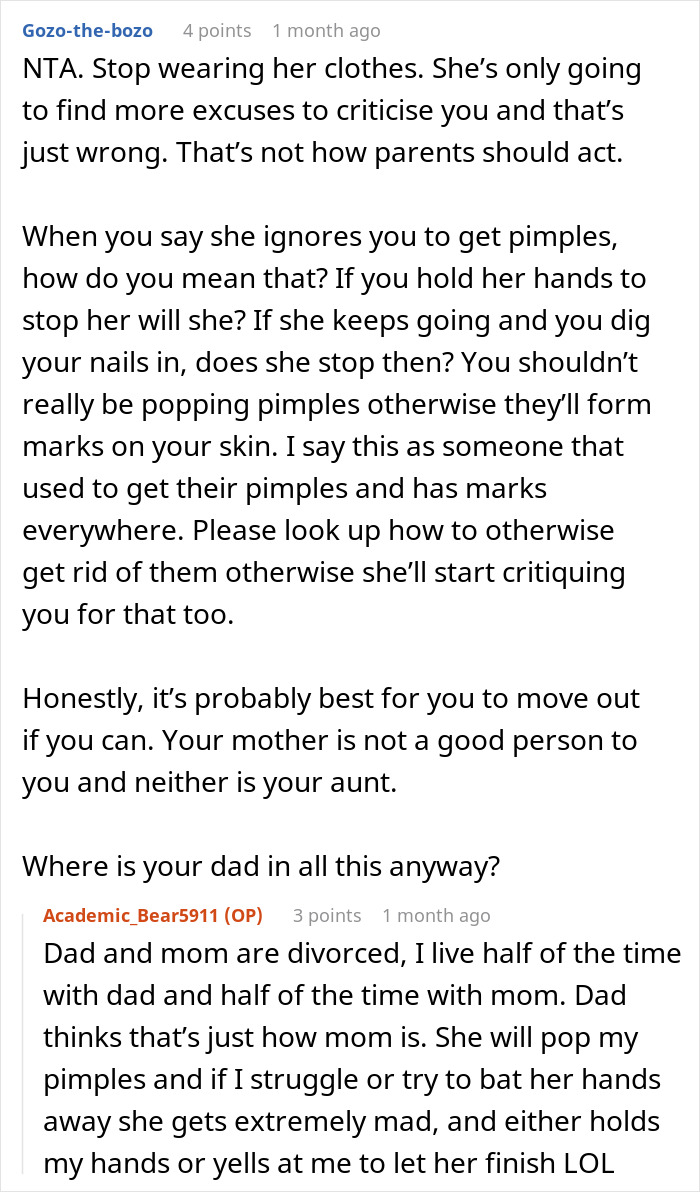
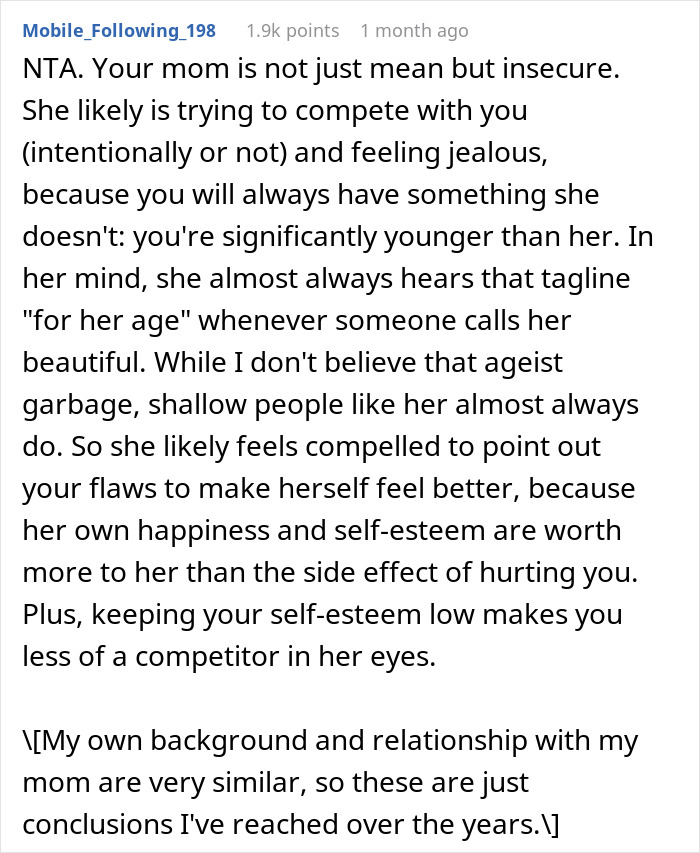
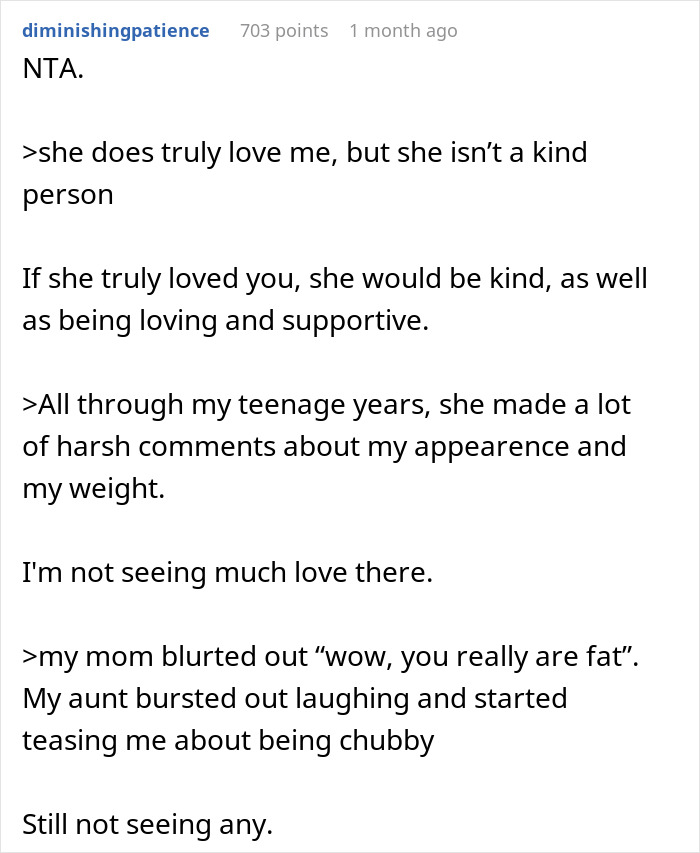



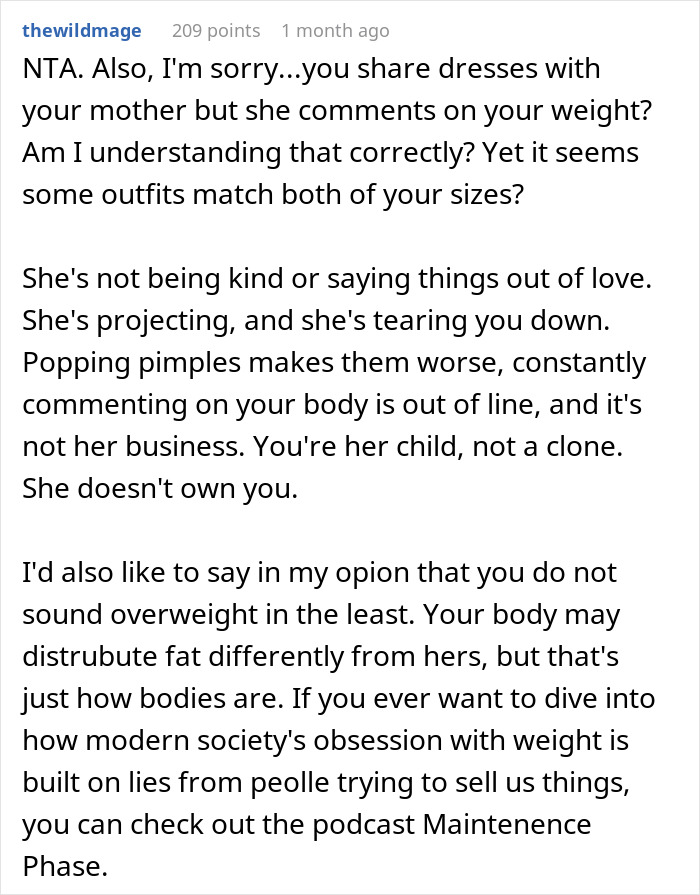

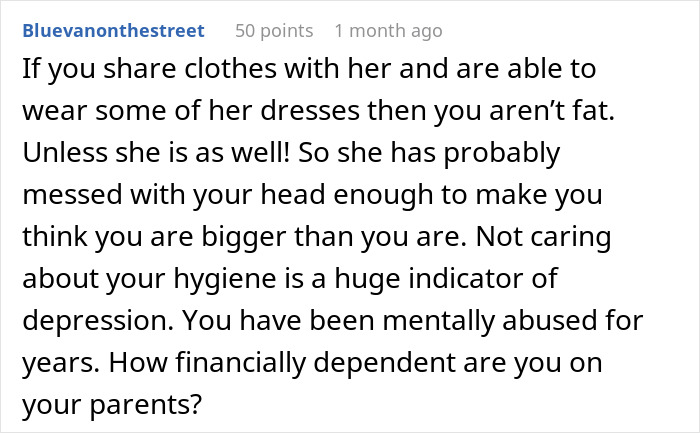


Not everyone was as understanding. Some people outright supported the mother in this

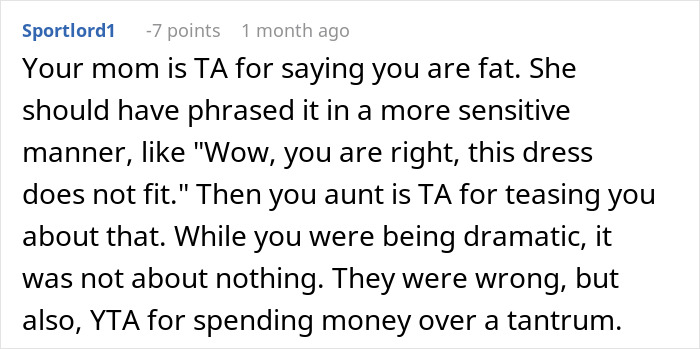
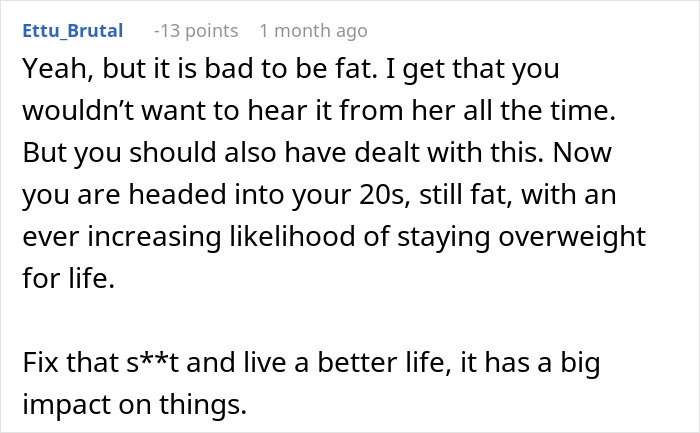

.png?w=600)





